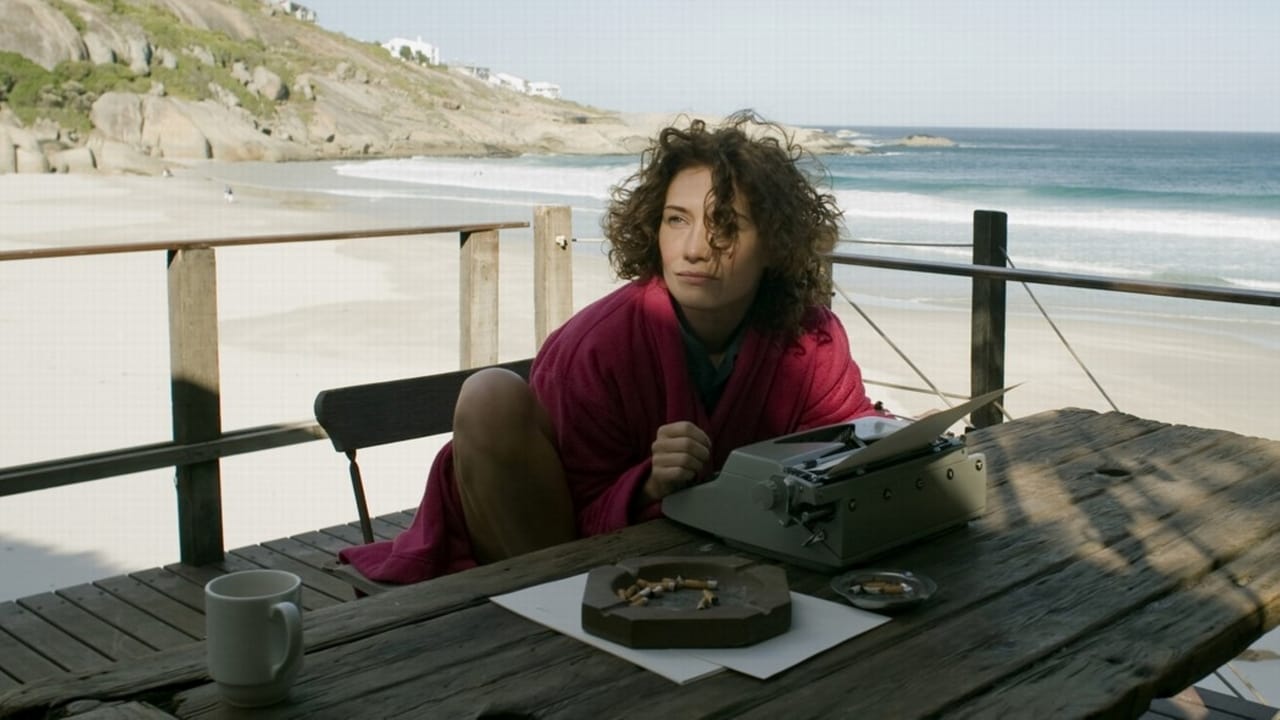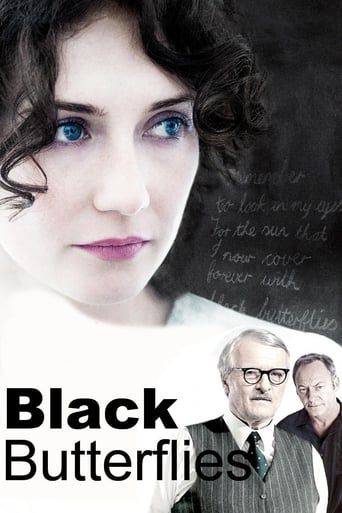

Very interesting film. Was caught on the premise when seeing the trailer but unsure as to what the outcome would be for the showing. As it turns out, it was a very good film.
... View MoreI have absolutely never seen anything like this movie before. You have to see this movie.
... View MoreBlending excellent reporting and strong storytelling, this is a disturbing film truly stranger than fiction
... View MoreThe movie runs out of plot and jokes well before the end of a two-hour running time, long for a light comedy.
... View MoreBlack Butterflies, a picture of the life of Ingrid Jonker (Carice van Houten) in South Africa during the years of Apartheid is a movie that leaves many impressions. She was a poet & the daughter of a South African MP or representative of an electoral district. Born to privilege, her mother died in an asylum she herself would later be admitted to herself. She showed signs of mental illness all her life & spent many of her days self medicating with sex & alcohol. Yet her talent with words is well documented in her poems.Being in conflict with her father's political beliefs she suffered an estrangement from him even when in the same room. It is well known that daughters who fail to receive the love they need from living fathers often turn to other men for love & approval. Sex, being the mechanism they try to use to obtain that that they lacked growing up, creating unstable relationships in their adult life too. They become a burden to those around them & not the first person you'd seek as a friend. Her choices as an adult leave a lot to be desired. Even her own daughter who she chose to leave motherless was used more as a crutch than an object of love & responsibility.She lived a life of mental turmoil in a country of extreme prejudice & hated that inequality. Unable to forget or assuage the pain of her circumstances, that pain grew over the years to choke her. Yet she became the voice of those that were declared less than human by her father's beliefs. A poem of hers was read at the first democratically elected South African Congress. It begins, "The child is not dead" She took her own life after having withstood all the pain & confusion she could in this life & that will always be controversial in this world. Who is to judge how a person that retains constant contact with mental agony so that it builds in them year by year with little or no relief is to be seen? We call those that overcome such circumstances heroes & hope we are like them. Yet those that see the inequities in this world & summarily reject such things for themselves while seeing them clear enough to describe them in verse, having those things enter their mind through their eyes on a daily basis, what can we say of them. Ingrid was a load to carry if you knew her & quite frankly I'm glad I didn't. I'm no fan of suicide either but I find more sorrow than condemnation in her passing. It is for certain that the people of a South Africa free of Apartheid see her as worthy of praise.Carice van Houten is excellent in portraying a life made of & lived by confusion. Rutger Hauer as her father & Liam Cunningham as her main love in life are strong in their roles as well. There is little in this movie that is shot as pretty or engaging scenery with the exception of the ocean. It's not intended to be pretty either in appearance or portrayal. Nudity is included but it is tastefully done. I was tempted to turn this off early on while they were displaying Ingrid's choices in life. It was a difficult watch to get through because of my dislike for her personality & life but I was glad I hung in till the end. I give it 4 out of 5 Amazon stars overall. 5 out of 5 for making me think through my reactions to it.It only rates 6.2 at IMDb but I think a lot of people quit on this one & rated it anyway.
... View MoreThe undeniable fact: we are born by parents. To be an individual: our responsible is to discard the parental form and replace our own. What we want to be and are. Guided by our very own ideas as model. Few reach this goal. A copy of what should be discarded. Not many manage and resume as copy their life. Among the not many is the life of Karin Jonkers. The fathers denial of his daughter, himself not only a writer but also a politician, made public in his speech his denial. The ultimate proof that both are individuals. Upright.Accepting the consequences. In public for all those cowards who choose the broad side of life. Like this his comment of her suicide has to be not only looked at but seen, reportedly he said: "They can throw her back in the sea for all I care." We have to, must as child of our parents discard the form we received at birth. By birth she was destined upper-class. Many are, growing up, revolutionary, sinking back into the comfortable frame of life. Even she. As it seemed. But consequently her loyalty was her own, focused on the South African questions many looked at, denying to see. Not caring what whoever told her to do: her divorced husband her lovers, her friend Jack Cope, himself a writer who always was there when needed. Nelson Mandela read her poem, "Die kind (wat doodgeskiet is deur soldate by Nyanga)" ("The child (who was shot dead by soldiers at Nyanga)"), in Afrikaans, during his address at the opening of the first democratically elected parliament on 24 May 1994.Ingrid Jonkers was homeless and in need of love. Apartheid, her father responsible for censorship was her enemy. Neither Jack Cope and Andre Brink helped or could help. She had to manage it alone. She was loved and loved but homeless. As it happened with the New Zealands poet and writer Janet Frame, also Ingrid Jonkers was periodical in a mental hospital: sent by her father! ... She and a few others home is the fringe of, what generally is called madness. But here, as society's fools, poetry and real life is the only true possibility. She is sane and insane. Not either-or but proofs that both is possible - as long as everything is given and nothing to loose and be taken.
... View MoreIt would be extremely useful if IMDb were to actually mention this on the movie's page somewhere.If you are not from South Africa, you've probably never heard of this poetess from that Aparathied era. Unfortunately, this movie is unlikely to make you want to learn any more about her as it portrays her as an extremely unlikable, self-centred, promiscuous abuser of everyone she meets. I have no idea if this is actually how Jonker was in life, and quite frankly this movie makes me not care in the least.I'm sure she must have had some redeeming qualities, but the lacklustre performances and horrible script disguise them well.
... View MoreButterflies tries to show us the hardship of the poet Ingrid Jonker in the 50's and 60's in South Africa; her social and mental struggles and the clashes with her family. Striving for equality between the races, she finds herself opposed to her father who heads up a government censorship board. This could have been a good backdrop for some decent drama and the portrayal of a country raped by apartheid. But besides shoving an unlikable protagonist down our throats (Jonker), the film offered very little in the way of plot and dialog. What was presented in stead was a 90 minute volley of uneasy situations with Jonker interacting with characters who turned up whenever the script required it without a plot-inspired narrative flow. The connections to her surrounding characters are never really explored and the development of situations felt awkwardly and needlessly rushed. The interactions between Jonker and her father for example, which should have been key scenes in the film, lacked any additional purpose besides the very obvious. Screenwriter Greg Latter, who did much better when he wrote the screenplay for the 2007 movie Forgiveness, also set in South Africa, really missed the mark here by only serving up predictable dialog for a historical drama that already lacked a discernible outline.Neither van Houten nor Hauer were particularly convincing in their roles and the acting by Liam Cunningham made their performances pale in comparison. But it was most of all van Houten who clearly wasn't up to the task. Her crass Dutch accent was particularly annoying, especially considering how easy it should be for a Dutch actress to get the S.A. accent right. Her acting also felt a bit labored at times which was compounded by her role mostly being fed dramatic clichés.There's a good soundtrack however, accompanying some very beautiful imagery but the movie as a whole is a rather lackluster and exasperating watch. 45/100
... View More